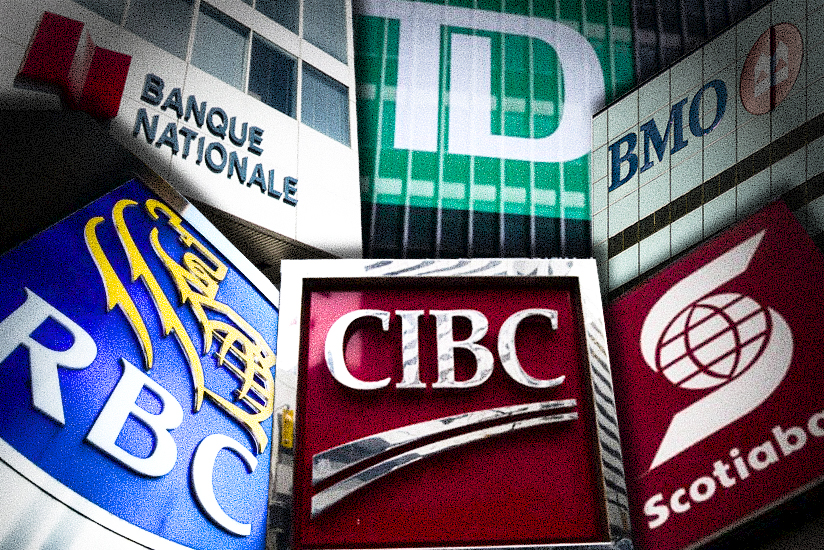
While the working class is grappling with economic uncertainty during the pandemic, Canada’s big banks are absolutely thriving. Toronto Dominion Bank (TD), Royal Bank of Canada (RBC), Bank of Montreal (BMO), Scotiabank and National Bank of Canada all saw Q2 profits more than double what they were this time last year, with RBC taking home the biggest chunk of change at $4 billion. Canadian Imperial Bank of Commerce (CIBC), meanwhile, more than quadrupled its Q2 profits, pocketing $1.65 billion, compared to last year’s paltry $392 million. All six major banks have bounced back since COVID-19 hit the economy like a Mack truck and are worth more than they were before, and shares for TD, RBC and CIBC recently hit record highs on the Toronto Stock Exchange.
However, these billion-dollar profits must not be enough for our ravenous banks, because various fees and charges have been hiked up recently at TD, BMO, and Scotiabank. CIBC will be following suit in July.
This parasitic cash-grab is happening while Canada’s labour market has lost more jobs than expected this spring. Job losses have affected precarious and low-paid workers worst of all—and so will the fee hikes, as TD is raising the minimum balance required to avoid fees from $2,000 to $5,000. Even before the pandemic more than half of Canadians were living paycheque to paycheque, hardly able to allow thousands of dollars to sit in their chequing accounts. Gouging those with the least money is especially callous. Essential workers can’t get a raise out of tightfisted bosses, but are expected to pad the profits of big banks.
The right wing whines about the high cost of measures like the Canada Recovery Benefit (CRB) that are meant to help ordinary workers during the pandemic, as if the money doesn’t exist. These astronomical banking profits show that it clearly does. The approximate $11 billion dollar price tag of the CRB would be more than covered by the big six’s profits, if only that money was in public hands—which in fact, it originally was.
Speaking to CBC, financial advisor Hilliard MacBeth explained how Canadians have been using their CRB money to pay back debt, which means the banks’ skyrocketing profits are being fed by taxpayer dollars: “the government of Canada came in with massive transfers of income and dollars to the households which essentially, if you think about it, is a transfer to the banks.” In 2020 the banks set aside huge sums to cover anticipated bad loans. But because of government bailouts those expected defaults never came. Now that backup money is getting transferred into profits, which is only possible because of government support. Banks take the risk, taxes cover the risk, and banks keep the profits.
It may yet turn out that the bankers have been overeager to get that money into their pockets, by the way. With the CRB starting to phase out in July and zombie corporations shambling towards their inevitable demise, bankruptcies and defaulted loans may wreak their havoc after all, just a little later than anticipated—another bad decision fueled by greed.
But all this indirect government support comes on top of massive government bailouts already paid to the banks between 2008 and 2010. Canadians have already shelled out enough to outright buy, or buy majority shares in, all the major banks. Over and over again the big banks are propped up by working class Canadians, and yet they stay in private hands for the profit of a select few. Meanwhile there is apparently not enough money for essential workers to make a decent wage, not enough money for contact tracing, not enough money for paid sick days, not enough money for anything that would actually help bring an end to the never-ending nightmare of COVID-19.
It is only by expropriating the banks that we can have control over the wealth that we as workers collectively produce, and put that wealth to good use for the benefit of all rather than the profits of a few.

